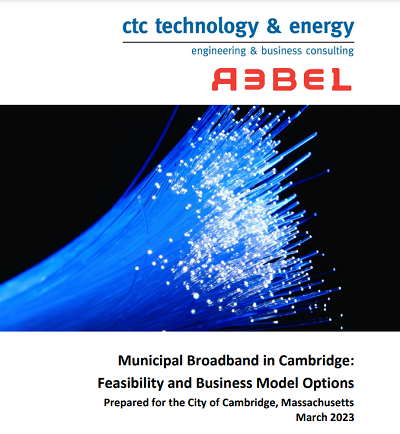
Fast, affordable Internet access for all.

Suwannee Valley Electric Cooperative (SVEC) has begun construction on an ambitious new fiber deployment that will soon bring affordable, multi-gigabit fiber access to all of the cooperative’s existing electrical customers in rural Northern Florida.
Cooperative officials tell ILSR its three-phase build out is well underway, with a beta anticipated this summer and the first commercial customers connected by August. SVEC Communications Director Jon Little says the cooperative’s goal remains to deliver affordable fiber to all 20,000 of the cooperative's current electric customers by the end of 2026.
“We’ve broken our territory into three phases based partly on population or possible customers,” Little said.
The cooperative’s recently created subsidiary, Rapid Fiber Internet, will interface directly with subscribers, while Conexon manages deployment of more than 4,100 miles of fiber. Electrical users won’t see price hikes; the projected $93 million deployment cost will be funded by a combination of grants and loans paid back exclusively through user subscriptions.

Little told ISLR that make ready (preparing utility poles for fiber attachments) prep and engineering for phase one are complete, and make ready construction for phase one is roughly 40 percent complete. He added that primary fiber construction for phase one is roughly twenty percent complete.
“We’re hoping that we will have a group of beta customers starting next month,” Little said. “We want to go about a month to get their feedback, and so we’re still hoping sometime in August to offer hookups to our members on that first feeder.”
Sometimes local coalitions can beat Goliath.
In July of 2022, Louisiana Gov. John Bel Edwards and several state lawmakers visited Lake Providence in East Carroll Parish to announce the community had secured a $4 million grant to build a fiber-to-the-home (FTTH) network in one of the most poorly connected parts of the state.
But, as we first reported here, the monopoly cable provider Sparklight (formerly known as Cable One) filed a challenge to the grant claiming the cable company already serves 2,856 homes there. Following Sparklight’s multi-state campaign to prevent competition in areas where the company operates, the challenge brought the project to a grinding halt, sparking Delta Interfaith to leap into action. With the help of allied organizations, the coalition was able to secure a major victory for community broadband in rural Louisiana.

The Power of Community-based Coalitions

Kitsap Public Utility District (KPUD) provides water, wastewater, and Internet service on Bainbridge Island and the neighboring peninsula in the Puget Sound in Washington state. It began building an open access fiber-to-the-home (FTTH) network in 2016 to address decades of poor DSL service as the only option offered by the private marketplace. Today, the Kitsap fiber network has grown to 500 route-miles and offers service to more than 1,600 premises via almost a dozen ISPs with the help of a growing team.
This week on the podcast, Christopher is joined by three members of that team: Allison Cotner (Telecom, Business, and Projects Manager), Stephanie Hall (Telecom, Business Development, and Community Relations Specialist), and Thomas Schreyer (Network Engineer). They share the building momentum in Kitsap County, driven by ever-increasing demand by residents and businesses for the publicly owned fiber network.
Christopher learns more Kitsap's innovation in using Local Utility Districts to drive expansion, which allows small groups of homes to petition KPUD to extend its network to their neighborhood. More than 50 have formed so far. He also hears about the flexible financing mechanisms the PUD and local government have created for households to foster expansion, and how happy residents are to see trucks in the area. Increased revenue has driven more investment in infrastructure to reach new households and new LUDs, which has meant more and more work for Stephanie and Thomas as they continue to build relationships with the local chamber of commerce and make sure that the network can sustain that growth far into the future.
Watch the video below to learn more about the expanding KPUD Fiber.
This show is 29 minutes long and can be played on this page or via Apple Podcasts or the tool of your choice using this feed.
Transcript below.
We want your feedback and suggestions for the show-please e-mail us or leave a comment below.
Listen to other episodes here or view all episodes in our index. See other podcasts from the Institute for Local Self-Reliance here.
Thanks to Arne Huseby for the music. The song is Warm Duck Shuffle and is licensed under a Creative Commons Attribution (3.0) license.
Inspired by Ammon, Idaho’s heralded open-access fiber network, the city of Eagle, located in the southwestern part of the state and home to 32,000 residents, is now soaring ahead with building its own open-access fiber network to connect city facilities and bring quality broadband to residents and businesses.
Eagle’s low density makes it expensive to connect, and as a result, the city has suffered from a lack of investment from private broadband providers. This has left residents – many of whom work from home or homeschool their children – with limited and antiquated options. But Eagle Mayor Jason Pierce wasn’t ready to hand over the city’s connectivity future to the big incumbents.
He explained to ILSR how Ammon’s “successful model” was the inspiration for Eagle and other cities across the Gem State to embark on a mission to provide city-wide connectivity and competition in areas underserved by the big incumbents.
“Cities were using [American Rescue Plan Act] ARPA dollars to help supplement […] private companies. We didn’t think that was the proper way to [go]. Federal dollars are the people’s money, they should own whatever we use it for. We need to be going after [public funding] to get [our residents’] tax dollars back into our communities.”
The open access network will give small local providers a chance to go into areas that it would not have previously made financial sense for them to serve. With the infrastructure already in place though, these companies will be able to enter the market and offer competition.
Longmont, Colorado’s NextLight community fiber network isn’t just delivering fast and affordable fiber access to locals, it’s consistently winning awards nationwide.
The city-owned network has topped PC Magazine’s Readers’ Choice rankings, which asked readers to rate their satisfaction with their residential broadband providers. Nextlight was also rated as the top gaming ISP of 2023, and was rated the fastest ISP in the nation in 2018 and the second fastest ISP by the magazine last year.
The city was also rated the 17th best work-at-home city in another 2022 survey. This latest survey asked magazine readers to assess ISP satisfaction based on speed, reliability and value. NextLight excelled at all three.
“NextLight's near-perfect scores, including an astronomic 9.9 for overall satisfaction, are unprecedented in the history of PCMag's surveys of ISPs,” the magazine noted. “The company's lowest score is for setup, and yet that number is still higher than almost any other rating earned by another ISP in any category.”
As California aims to boost broadband competition and Los Angeles County pursues what could be the biggest municipal broadband network ever built, local activists say they’ve made some meaningful recent inroads on both improving broadband mapping, and regulatory reform that should aid the equitable deployment of modern, affordable access.
Recently, inroads have been made on fixing long-broken California cable franchise law. In the early aughts, cablecos (and telcos pushing into the TV business) successfully lobbied for state-level “cable franchise reform” laws they promised would dramatically lower prices. In reality, such bills were often little more than legislative wishlists crafted by telecom giants.
Often these state-level replacements for local franchise agreements eroded legal regulatory authority, eliminated long standing requirements for uniform broadband and TV deployment, and in some states–like Wisconsin–even acted to strip away local consumer protections and eminent domain rights. Warnings by academics on this front were widely ignored.
Seventeen years after its passage, California activists say that California’s 2006 Digital Infrastructure and Video Competition Act (DIVCA) was no exception.
In Cambridge, Massachusetts, digital equity advocates and city leaders have been debating the idea of building a citywide municipal fiber network for years now, mostly over whether the estimated $150 to $200 million it would cost to build the network would be worth it.
In a tech-savvy city, home to Harvard and MIT, the former city manager was resistant to a serious inquiry into municipal broadband. He retired last summer. But before he left, he relented on the broadband question – under pressure from city councilors and a local citizen group advocating for municipal broadband, Upgrade Cambridge.

With many residents weary of being held hostage to the whims and high cost of service from the monopoly provider in town (Comcast), which currently controls 80 percent of the city’s market, in 2021 the city hired the well-regarded Maryland-based consulting firm CTC Technology & Energy to conduct a thorough feasibility study. Now, with a new supportive city manager in office, city leaders have agreed to continue to investigate the options laid out in the recently published study.
‘Significant Public Support’ Even If It Requires Tax Money

Join us Friday, May 26, at 2pm ET for the latest episode of the Connect This! Show. Co-hosts Christopher Mitchell (ILSR) and Travis Carter (USI Fiber) will be joined by regular guests Kim McKinley (UTOPIA Fiber) and Doug Dawson (CCG Consulting) to talk about all the recent broadband news that's fit to print. They'll chat about Gigapower, Anna Gomez' nomination to the FCC, and more.
Email us at broadband@communitynets.org with feedback and ideas for the show.
Subscribe to the show using this feed or find it on the Connect This! page, and watch on LinkedIn, on YouTube Live, on Facebook live, or below.
Quincy, Massachusetts is moving full speed ahead on a long-percolating plan to bring faster and more reliable broadband to a community long neglected by regional telecom monopolies.
If successful, the resulting open access fiber network should dramatically boost competitive options in the city, driving down costs for what many view as an essential utility.
After five years of debate and planning, Quincy officials say they’re getting closer to launching a city owned open access fiber network that will provide a backbone for city services, as well as a major infusion of long overdue broadband competition citywide.
Quincy Ward 3 Councilor Ian Cain told ISLR that the city is planning to launch trial deployments in Merrymount and Quincy Point during the next few months. The city has long worked with Entrypoint networks as a technical consultant and project financial planner, and city officials are expecting an engineering and feasibility study from Tilson within a matter of weeks.
RFP Coming Soon
“We're intending to bring the request for financing before the council before the end of session, which is at the end of June,” Cain said.
"We'll be putting out an RFP for the open access component of the project soon as well. We hope to fund the project through the city council before the summer, and then ideally we would start construction in the fall."
The initial pilot project will be funded by a general obligation bond. City leaders stated Merrymount and Quincy Point were selected both with an eye on socioeconomic diversity, and because the city was certain they’d see a relatively high adoption rate.
"Quincy Point in particular has a lot of economic and cultural diversity, and I think that's really important to emphasize as we move forward," Ward 2 City Councilor Anthony Andronico said of the city’s effort. "Quincy Point and Merrymount will have an opportunity to see what works with this program, what we can improve upon and help expand it to the whole city.”
Colorado state leaders have voted to eliminate long-criticized state barriers to municipal broadband networks. Community broadband advocates hope it will be a beacon for other states eager to bring more reliable and affordable high-speed Internet service to a market long dominated by monopoly providers.
The Colorado decision, made after years of citizen backlash to the counterproductive restrictions, is the latest inflection point in a retreat away from monopoly-backed state laws stifling creative efforts to bridge the digital divide.
On May 1, Colorado Governor Jared Polis signed Senate Bill 23-183. The new law formally eliminates an older 2005 law backed by regional telecom monopolies, which imposed cumbersome and onerous restrictions on Colorado towns and cities looking to build better, more affordable community-owned and operated broadband networks.
“SB23-183 removes the biggest obstacle to achieving the Governor’s goal to connect 99% of Colorado households by the end of 2027,” Colorado Broadband Office Executive Director Brandy Reitter said of the decision. “Each local government is in a unique position or different phase of connecting residents to high-speed internet, and this bill allows them to establish broadband plans that meet the needs of their communities.”
Colorado state leaders say the repeal puts them in a prime position to capitalize on numerous digital equity programs designed to address Colorado’s digital divide, as well as the more than $42 billion in broadband subsidies soon to be distributed courtesy of the recently-passed Infrastructure Investment and Jobs Act (IIJA).
“With large amounts of federal funding coming from the IIJA bill, we wanted communities to be ready to receive this money,” Colorado Representative Brianna Titone told ILSR.
Last year, Governor Polis signed an executive order formally setting a goal of connecting 99% of Colorado households by the end of 2027. Colorado state leaders have previously stated they expect their share of IIJA/BEAD funding to be between $400 and $700 million; money that can now be used more broadly on a diverse array of creative broadband solutions.